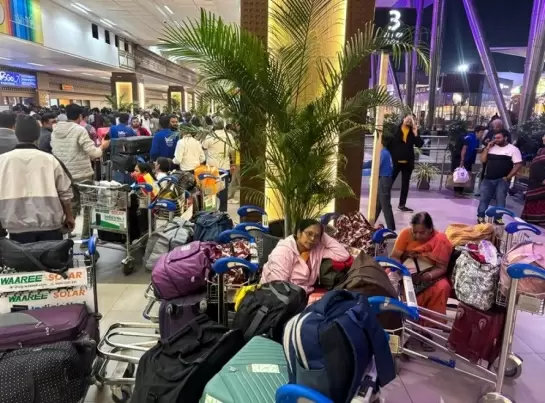How Three Engineers Left IT Jobs to Build Sustainable Farms for City Folks
Sudha Narasimhachar
|
25-August-2025
Vol 16 | Issue 35
Life in crowded, noisy, and polluted cities becomes difficult after a few years. People long for peaceful getaways in forests, waterfalls, rivers, or resorts to escape their mechanical lives. But not everyone can afford such holidays.
Age, health, or financial reasons often prevent it. Also, not all of us are fortunate to have ancestral homes in villages where elders pamper us with fresh food grown on their farms.
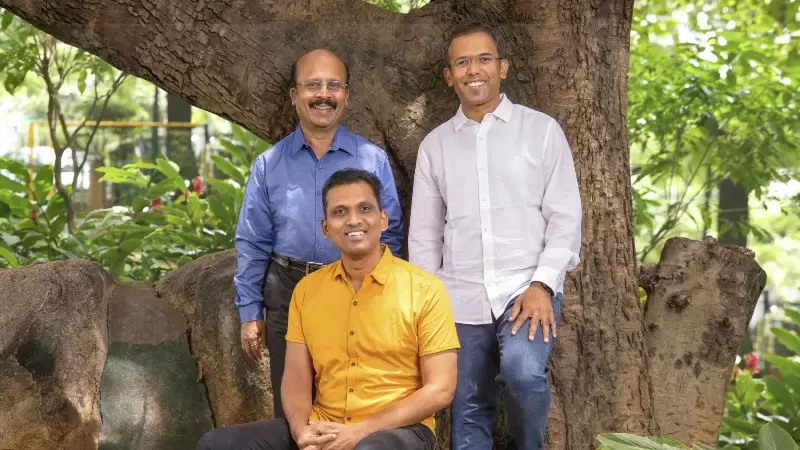
| Hosachiguru founders (from left) Ashok Jayanthi, Sriram Chitlur, and Srinath Setty, who turned a dream into a green reality (Photos: Special Arrangement) |
To give people such an experience, three friends started Hosachiguru in 2014. Their idea was to let city dwellers own small farms which the company would manage, while also reviving barren or overused lands into fertile forests. This would improve soil health, groundwater, and even local climate.
The founders are Ashok Jayanthi, Sriram Chitlur, and Srinath Setty. Ashok shared how the journey began. “I used to work in BEML, KGF as a product designer. I got a better opportunity in L&T and joined that company.

“From there I jumped to Satyam Computers and entered the software field of product design. Of course, financially I got a huge jump but very soon I started missing the physical contact with the products that I designed at L&T. Life became mundane and boring.”
Ashok had met Shriram at L&T and both later worked at Satyam. They often discussed their thoughts. Once, while buying soaps from Karnataka Soaps and Detergents, they were surprised to see sandalwood saplings being sold.
Ashok asked, “How come you are selling sandalwood saplings? Isn’t it illegal to grow sandalwood privately?”
The staff explained that the law banning sandalwood cultivation, introduced during Tippu Sultan’s time, had been repealed in 2001. “Now we are promoting sandalwood cultivation,” they said.
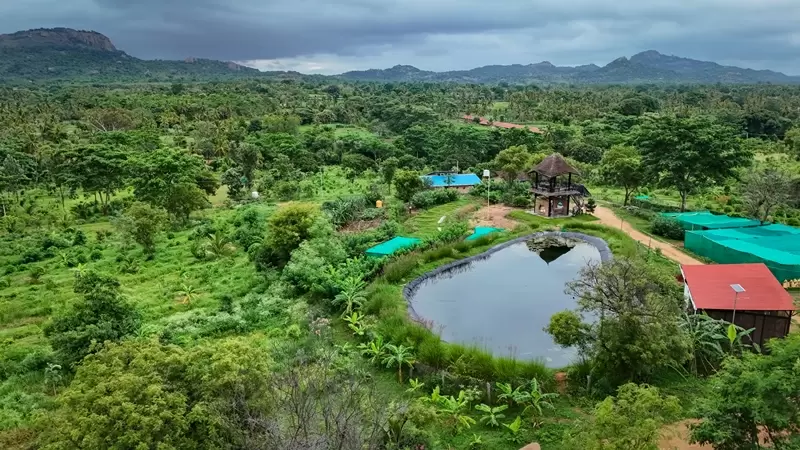
| An aerial view of Hosachiguru’s eco-friendly managed farms, with rainwater harvesting ponds and lush greenery |
“Something rang within me. My cousin owned 50 acres of land in Rayadurga in Andhra Pradesh. I thought we could explore sandalwood cultivation there,” recalled Ashok. “My cousin agreed. We bought saplings from various nurseries and started the project. But those saplings did not grow healthily.”
Later, between 2007 and 2009, they consulted experts at the Indian Institute of Wood Sciences and managed to grow sandalwood successfully. They even became the first outside Karnataka to sign an agreement with KSDL for purchase of sandalwood. Alongside, they set up a nursery and started selling healthy saplings.
This was not just farming. They learnt about soil health, plant care, water management, and how to recharge borewells. Rainwater harvesting expert Ayyappa Masagi trained them and they created a pond.
During this time Ashok quit L&T to manage the farm fully. Friends and family showed curiosity, and some wanted to invest. In 2011, they bought another 18 acres near Rayadurga, developed it with teak, sandalwood, and crops like muskmelon, pomegranate, and ginger. One of their customers, Srinath Shetty, grew interested and joined them as a partner in 2012.
In 2014, the three of them launched Hosachiguru formally. Shriram and Srinath also left their jobs to focus on it. At their Gorantla farm called EOS, they began experimenting with permaculture, a sustainable farming method.
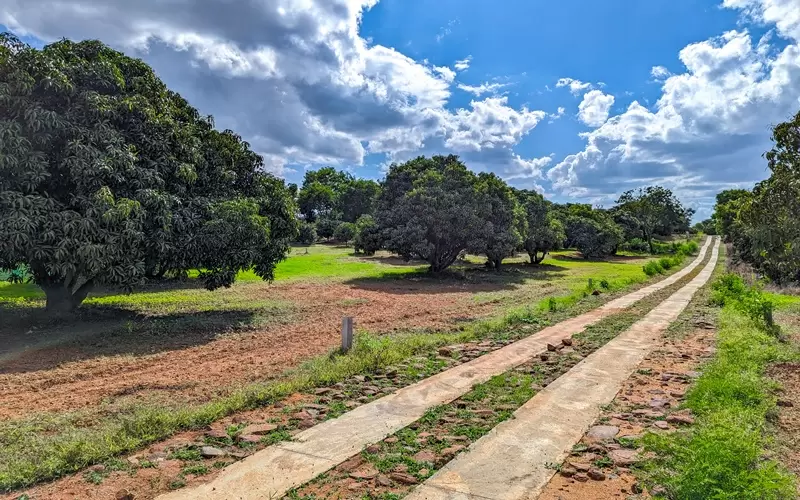
| Tree-lined paths and orchards at Hosachiguru farms |
In the last five years, this approach helped them avoid using more than 2000 tons of chemical fertiliser. They used natural preparations like jeevamrutha, agni astra, and neem astra. They also followed “no-till” farming, avoided uprooting weeds, and used mulching to improve soil carbon.
Their first projects came up in Andhra Pradesh and Tamil Nadu, where rules allowed non-farmers to invest in farmland. At Abivriddi in Andhra Pradesh, mango yield rose from 10 tons last year to 30 tons this year.
“Today, we are proud to say that we have developed a total of 27 such managed farm plot projects in Andhra Pradesh, Tamil Nadu and Karnataka. We launched Dhaanvi in Karnataka, after the restriction of non-farmers investing in farms was removed,” Ashok said.
He added that demand rose during COVID when people realised the value of fresh air, organic food, and spaces where children could connect with nature.
The company also supports small farmers who cannot manage their lands. Hosachiguru consolidates such parcels, studies the legal documents, and develops them into quarter or half-acre plots for customers.
They plant trees, nurture them with natural fertilisers, replace dead saplings, and even harvest fruits. They also maintain kutcha roads, build ponds for rainwater harvesting, and rear cows for manure and pesticides. Customers can build homes or use common cottages and canteen facilities when visiting.
Ashok explained, “Thus, we are helping many urban dwellers to enjoy their own farms, even if it is just a quarter or half an acre, with least efforts, as they are busy with their jobs and education of children and the hassles of developing their own farmlands are many – legal, labour issues, water and politics.”
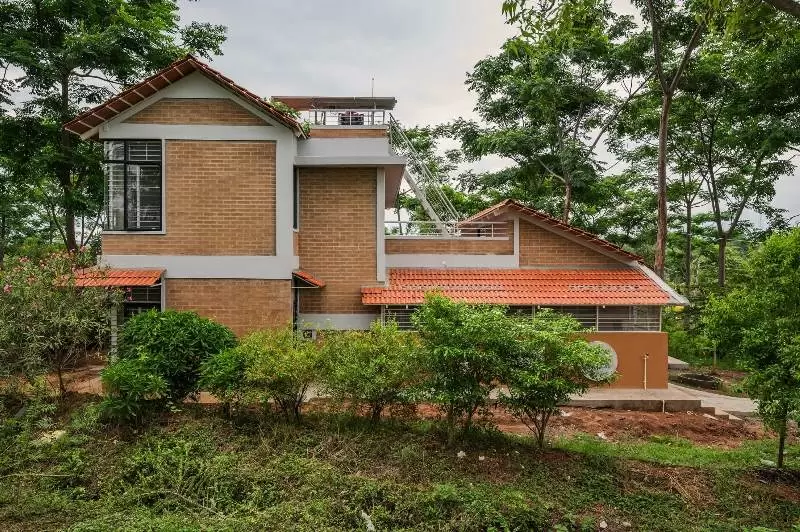
| A serene farmhouse named ‘Kanasu’ at Hosachiguru’s Dhaanvi project, where author Sudha Narasimhachar enjoys living close to nature |
The farms are designed to preserve biodiversity. With wild zones and mixed plantations, animals like deer, foxes, peacocks, and many birds visit freely. Hosachiguru has so far developed 1500 acres for 1500 co-farmers. The company employs more than 200 office staff, 100 full-time labourers, and 150 seasonal workers.
The founders say they are happy to be contributing to increasing forest cover, reviving soil, recharging groundwater, and creating spaces where the younger generation can live healthier lives.
The author, Sudha Narasimhachar, lives in ‘Kanasu’, her farmhouse built on a managed farm plot purchased from Hosachiguru at their Dhaanvi project. Writing this article from ‘Kanasu’, she says it is a joy to sit amidst nature with birds and even peacocks in the background. Professional photographer Raviteja Devarakonda, who captured the farmhouse, described it as “a home that lives up to its name, which means dream in Kannada – a quiet exhale, far from the city’s noise. - ©TWL












